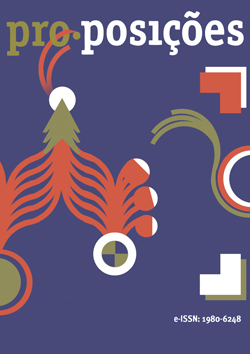Abstract
The presence of social medias in teacher- student interactions raises questions on the collective work of managing proximity and distance. From teachers’ testimonies extracted from a video documentary we sought to understand practices of management of school interactions on Facebook. The reports are analyzed in the light of two categories of analysis that, organized to apprehend everyday situations, gather the impressions teachers have when discussing Facebook use. The first one points to what we have called the “gathering of differentiated social circles”, allowing us to recognize the uniqueness of a space such as Facebook in relation to the management of proximity and the distance of the teacher from the school public. The second is distinguished by the “technical conditions of discretion,” signaling margins of maneuvers teachers can use on the online social network, establishing an ideal form of interaction with their students. These categories result in a reality in which teachers manage both their relationships with the school audience (and technology) as well as their personal images and the possible educational (dis)credits associated with them.
References
Aspling, F. (2011). The private and the public in online presentations of the self: a critical development of Goffman’s dramaturgical perspective. Dissertação de Mestrado, Stockholms universitet, Stockholm.
Baudelaire, C. (1996). Pequenos poemas em prosa: edição bilíngue (Trad. Dorothée de Bruchard). Florianópolis: Editora da UFSC.
Benelli, S. J. (2003). O internato escolar “O Ateneu”: produção de subjetividade na instituição total. Psicologia USP, 14(3), 133-170. doi:10.1590/S0103-65642003000300011
Berger, P. L., & Luckmann, T. (1967). The social construction of reality: a treatise in the sociology of knowledge. New York: Archor Books.
Breton, P. (2012). Le culte de l’internet: une menace pour le lien social? Paris: La découvert.
Burns, T. (1992). Erving Goffman. London: Routledge. Carrano, P. (2013, 25 de julho). Uma escola entre redes: documentário de pesquisa [Postagem on-line]. Recuperado de http://www.emdialogo.uff.br/content/uma-escola-entreredes-sociais-documentario-de-pesquisa
Casilli, A. (2010). Les liaisons numériques: vers une nouvelle sociabilité? Paris: Éditions du Seuil.
DaMatta, R. (1997). Carnavais, malandros e heróis: para uma sociologia do dilema brasileiro (6a ed.). Rio de Janeiro: Rocco.
Dostoievski, F. (2009). Memórias do subsolo (Trad. Boris Schnaiderman, 6a ed.). São Paulo: Editora 34.
Durkheim, E. (1938). L’évolution pédagogique en France: des origines a la renaissance. Paris: Librarie Félix Alcan.
Elias, N. (1994). A sociedade dos indivíduos (Trad. Vera Ribeiro). Rio de Janeiro: Zahar.
Freund, C., & Biar, L. (2017). Gerenciando o estigma do professor contratado: uma análise de discurso crítica. Educação em Revista, 33, e166838. doi:10.1590/0102-4698166838
Giddens, A. (1996). The consequences of modernity. Cambridge: Polity. Goffman, E. (1959). The presentation of self in everyday life. New York: Archor Books.
Goffman, E. (2002). A representação do eu na vida cotidiana. Petrópolis: Vozes.
Guigue, M., & Boulin, A. (2016). L’internat scolaire: limites et paradoxes d’une institution totale. Educação e Realidade, 41(4), 985-1002. doi:10.1590/2175-623661105
Isaac, M., & Ember, S. (2016, 29 de junho). Facebook to change news feed to focus on friends and family. The New York Times. Recuperado de http://www.nytimes.com/2016/06/30/technology/facebook-to-change-news-feedto-focus-on-friends-and-family.html?_r=2
Jacobsen, H. M., & Kristiansen, S. (2014). The social thought of Erving Goffman. Sage: London.
Manning, P. (1992). Erving Goffman and modern sociology. Cambridge: Polity Press.
Martuccelli, D. (1999). Sociologies de la modernité: l’itinéraire du XXe siècle. Paris: Gallimard.
Moulin, L. (1994). A vida quotidiana dos estudantes na Idade Média. Lisboa: Livros do Brasil.
Presos fingem ser médicos, ligam e pedem dinheiro para exames. (2017, 27 de julho). Jornal nacional. Recuperado de http://g1.globo.com/jornal-nacional/noticia/2017/07/presosfingem-ser-medicos-ligam-e-pedem-dinheiro-para-exames.html
Professora é demitida por não excluir alunos do Facebook. (2017, 10 de setembro). O globo. Recuperado de https://oglobo.globo.com/sociedade/tecnologia/professora-demitidapor-nao-excluir-alunos-do-facebook-12136971
Projeto de Lei 995/2015. (2015). Acrescenta dispositivo à Lei nº 12.965, de 23 de abril de 2014, que estabelece princípios, garantias, direitos e deveres para o uso da Internet no Brasil. Recuperado de http://bit.ly/36uLHKE
Rouche, M. (1981). Histoire génerale de l’enseignement et de l’éducation en France: des origines à la Renaissance: Ve siécle av. J.-C. – XVe siècle (Vol. 1). Paris: Perrin.
Schilling, F., & Miyashiro, S. G. (2008). Como incluir? O debate sobre o preconceito e o estigma na atualidade. Educação e Pesquisa, 34(2), 243-254. doi:10.1590/S1517- 97022008000200003
Simmel, G. (2006). Questões fundamentais de sociologia: indivíduo e sociedade (Trad. Pedro Caldas). Rio de Janeiro: Zahar.
Smith, G. (2006). Erving Goffman. Routledge: London. Weber, M. (2013). Ciência como vocação. In A. Botelho (Org.), Essencial sociologia (pp. 392-431). São Paulo: Companhia das Letras.
A Proposições utiliza a licença do Creative Commons (CC), preservando assim, a integridade dos artigos em ambiente de acesso aberto.


